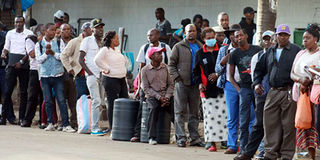Why leaders got it wrong on curfew

Commuters wait at a bus stop at Tom Mboya Street in Nairobi on April 2, 2020, as they try to beat the 7pm-5am curfew. PHOTO | DENNIS ONSONGO | NATION MEDIA GROUP
What you need to know:
- During a curfew, it is not just working hours that need to be adjusted but the understanding of what this adjustment means.
- A curfew increases pressure on a transportation system that is already grappling with other systemic inadequacies.
I believe it is essential to start by saying that no one is opposed to the nationwide curfew that started on March 27 as an attempt to flatten the Covid-19 curve.
That being said, a curfew needs to work within the context of various factors or else it doesn’t achieve its required outcome.
First off, the brutal law enforcement culture. From the get-go, it was easily predictable that the police were going to do that which they often do, brutalise anyone from exactly 7pm when the curfew started.
The saddest thing about this was not its predictability but the habitual way of how poor Kenyans are seen as deserving of a brute police force.
The use of this excessive force when enforcing government directives is not just unlawful but is deeply rooted in colonial ideology.
It is the ideology that stereotypically labelled people it intended to brutalise as unruly savages as a way to justify the brutality meted upon them.
CHAOTIC SYSTEM
Secondly, a none existent transport system. As someone who has used public transportation, I understand what it means to plan your daily life within a transport system that is none existent.
The Kenyan public transport system of any kind — rail, road or water — is rogue and disorganised.
Commuters are forced to endure decrepit passenger trains, ferries or buses that don’t meet safety standards, or meet the high number of public transport users.
Due to these factors, a curfew increases pressure on a transportation system that is already grappling with other systemic inadequacies.
Thirdly, unplanned scenarios. During a curfew, it is not just working hours that need to be adjusted but the understanding of what this adjustment means.
GOOD IMPLEMENTATION
It is why hypothetical scenarios are a key part of strategic implementations as a way to figure out how to mitigate unforeseen issues.
While everyone is focused on Covid-19, there are emergencies that may arise. I mean other diseases or incidences didn’t take a break.
There are people living with pre-existing medical conditions and those who work at night like fishermen.
The question then is how do these scenarios play out in a curfew that is being enforced not by dialogue or dignity but by brute force?
Kenyans need to know how they engage if an emergency arises. Will there be free county ambulance services? How are people protected from brutality and extrajudicial killings?
And lastly, how do we start making this curfew work for the majority of vulnerable people like everyday income earners whose business are currently suffering and street families?
As I said, we all agree that a curfew is OK, what we need is to ensure its implementation does not violate human rights any further.
Scheaffer Okore is a policy analyst; [email protected]





